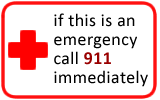Eye - Allergy
Eye - Allergy
Does this describe your child's symptoms? |
Definition
Symptoms
Causes
|
If not, see these topics
|
When to Call Your Doctor |
Call Your Doctor Within 24 Hours (between 9 am and 4 pm) If |
|
|
|
Call Your Doctor During Weekday Office Hours If |
|
|
|
Parent Care at Home If |
|
|
HOME CARE ADVICE FOR EYE ALLERGY |
Wash Allergens Off the Face:
Use a wet washcloth to clean off the eyelids and surrounding face.
Rinse the eyes with a small amount of warm water (tears will do the rest).
Then apply a cold wet washcloth to the itchy eye.
Wash the hair every night because it collects lots of pollen.
Oral Antihistamines:
If the nose is also itchy and runny, your child probably has hay fever (i.e., allergic symptoms of the nose AND eyes).
Give your child an oral antihistamine, which should relieve the nose and the eye symptoms.
Oral antihistamines usually control the eye symptoms and avoid the need for eye drops.
Benadryl or Chlorpheniramine (CTM) products are very effective (no prescription needed). They need to be given every 6 to 8 hours (See Dosage table). The bedtime dosage is especially important for healing the lining of the nose.
Continue oral antihistamines every day until pollen season is over (usually 2 months for each pollen).
New Antihistamine Eye Drops (Ketotifen) for Pollen Allergies - 1st Choice:
Usually an oral antihistamine will adequately control the allergic symptoms of the eye.
If the eyes remain itchy and poorly controlled, buy some Ketotifen antihistamine eyedrops (no prescription needed).
Dosage: 1 drop every 12 hours
Ask your pharmacist to recommend a brand (e.g. Zaditor or Alaway)
For severe allergies, the continuous use of ketotifen eye drops on a daily basis during pollen season will give the best control.
Older Antihistamine/Vasoconstrictor Eye Drops - 2nd Choice:
Usually the eyes will feel much better after the allergic substance is washed out and cold compresses are applied.
If not, this type of eye drop can be used for intermittent eye allergy symptoms (no prescription needed).
Ask your pharmacist to recommend a brand. Examples are Naphcon A, Opcon A or Visine A.
Avoid vasoconstrictor eyedrops without an antihistamine (without an A in the name). Reason: they only treat the redness, not the cause.
Dosage: 1 drop every 8 hours as necessary.
Avoid continuous use for over 5 days. (Reason: rebound red eyes)
Disadvantage: less effective than Ketotifen eye drops.
Contacts: Some children with contact lenses may need to switch to glasses temporarily (Reason: to permit faster healing).
Expected Course: If the allergic substance can be identified and avoided (e.g., a cat), the symptoms will not recur. Most eye allergies continue through the pollen season (4 to 8 weeks).
Call Your Doctor If:
Itchy eyes aren't controlled in 2 days with continuous allergy treatment
Your child becomes worse
And remember, contact your doctor if your child develops any of the "Call Your Doctor" symptoms.
Updated:
March 22, 2017



